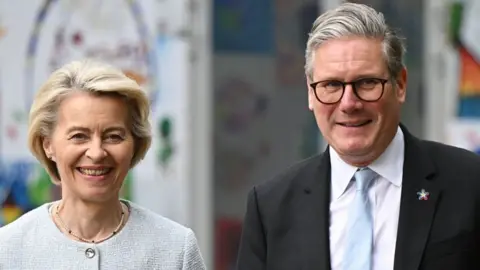The ongoing negotiations between the United Kingdom (UK) and the European Union (EU) are intensifying as the two parties strive to finalize a deal ahead of an important summit set to take place on Monday. With hours left before the meeting, Prime Minister Sir Keir Starmer and European Commission President Ursula von der Leyen are in discussions that could cover a wide array of critical issues.
As outlined in the recent reports, the proposed deal could potentially encompass several key aspects, including the establishment of a youth mobility scheme that would allow UK passport holders to utilize EU airport e-gates. Furthermore, announcements related to trade, security, and fishing rights may also be on the agenda. However, despite the anticipation surrounding these potential agreements, figures like Conservative leader Kemi Badenoch and Reform UK leader Nigel Farage have already characterized the negotiations as a form of “surrender”, signaling a divide in public opinions regarding the possible outcomes.
Negotiations are led by Nick Thomas-Symonds, the Minister for UK-EU Relations, who conveyed his mixture of optimism and pragmatism during an interview on BBC’s “Sunday with Laura Kuenssberg”. He stated that he is committed to achieving results focused on employment, reducing household expenses, and fortifying borders. Nevertheless, he refrained from disclosing specific details regarding the deal, maintaining that nothing is finalized until all elements are agreed upon.
One possibility under discussion is access for the UK to a substantial EU defense fund valued at approximately €150 billion (£125 billion). Such a provision could present significant opportunities for UK defense services, enhancing their competitive standing. Additionally, discussions about fishing rights are crucial, particularly since the existing post-Brexit deal on these rights is due to expire at the end of June 2026. The government has made it clear that conceding any rights to British waters and resources would be viewed as a betrayal against UK fishermen, underscoring the sensitivity around this topic.
Moreover, there are credible reports hinting at the establishment of a mobility scheme for youths, an idea that Starmer has suggested would create a framework allowing young individuals to move abroad for up to two years. Yet, the proposals have drawn mixed reactions from opposition parties, with some condemning it as a potential reinstatement of free movement through indirect channels.
The Liberal Democrats have expressed support for a “capped mobility scheme”, yet they have also critiqued the government for proceeding with negotiations at a slower pace than expected, pointing out inefficiencies in the process. Meanwhile, elements of the proposed agreements also include allowing UK citizens to use EU e-gates to expedite their travel and reducing bureaucratic hurdles associated with food exports and imports.
Thomas-Symonds has noted the significant delays that have hindered the transit of goods, particularly fresh produce, into Europe, leading to waste and frustrating logistical challenges. He emphasized the urgency of resolving these issues to restore smoother operations. However, some Conservative MPs, like Alex Burghart, have expressed caution, fearing that adherence to EU standards may reduce the UK’s autonomy and reestablish it as a “rule taker”, an aspect of EU membership that many sought to avoid through Brexit.
Negotiators and other stakeholders eagerly await the outcomes of these talks as they bear significant implications for future UK-EU relations and the overarching post-Brexit landscape. As conversations continue to unfold into the evening and the summit approaches, the atmosphere is charged with both hope and skepticism regarding the ability to reach a consensus that satisfies both parties.



